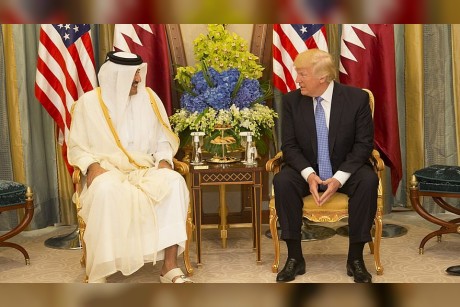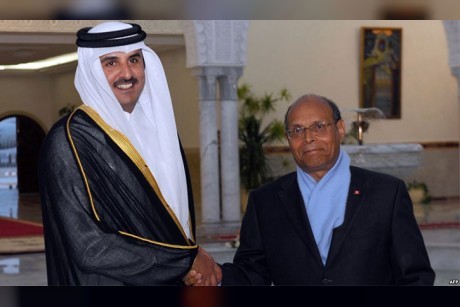The United States Mission to the United Nations chose to accept a diplomatic immunity claim last month made by a Qatari agent who led the hacking of a prominent Republican donor and the leaking of his emails to the media.
JNS reported.
The diplomatic immunity claim was a sham—the Qatari agent hadn’t worked as a diplomat since leaving his job at the United Nations a year before, and instead was employed by Qatar managing a criminal operation to destroy the reputations of prominent American critics of Qatar. Qatar and Morocco claimed that he enjoyed diplomatic immunity, not because he was a diplomat, but in order to shield him from a lawsuit brought by one of his victims.
The State Department made the decision to side with Qatar over a U.S. citizen, but openly act as if Qatar is a friend and ally. Why do the standard rules of foreign policy seem never to apply to the country?
The Qatar-backed hacking target list includes a Democratic Party operative, an ex-CIA official, Bollywood actresses, FIFA soccer players, a celebrity rabbi and former Republican National Committee Chair Elliott Broidy.
NBC News first reported that the U.S. Mission to the United Nations reviewed Morocco’s diplomatic accreditation of Jamal Benomar, and that the U.S. Mission to the United Nations “registered Benomar with diplomatic privileges and immunities.”
Benomar, who resides outside of New York City, became an adviser for the government of Qatar after he retired from the United Nations in 2017.
Qatar is known to be a leading funder of Hamas and the Muslim Brotherhood, both of which are terrorist adversaries of Israel. After Broidy’s lawsuit against Benomar in July, Benomar arranged to have Morocco accredit him to the Moroccan Mission to the United Nations.
Several weeks later, in September, Morocco notified the State Department that Benomar was a “Minister Plenipotentiary,” in an effort to secure his diplomatic-immunity status and ultimately shield the ex-diplomat from Broidy’s lawsuit.
Broidy’s lawsuit claims that Benomar had orchestrated the dissemination to the media of his hacked emails, including emails and other business documents belonging to Broidy’s wife in an attempt to damage Broidy’s reputation and discredit his criticism of Qatari policy.
Now, experts have begun questioning whether the U.S. Mission’s affirmation of Morocco’s accreditation of Benomar might violate the mission’s established criteria for affording an individual the full-status diplomatic immunity it granted Benomar.
‘State’s effort to protect a Qatari agent’
“The most bizarre part of this story is why they went along with state’s effort to protect a Qatari agent credibly accused of crimes from being held accountable,” said the head of a pro-Israel Republican group, who requested anonymity in order to speak candidly. “What Qatar did to a prominent Republican donor and pro-Israel stalwart is a disgrace … by offering one of the perpetrators diplomatic immunity, the State Department is protecting Qatar from accountability.”
In HC-01-16, the U.S. Mission states that diplomatic privileges and immunities “will be conferred only with respect to categories of individuals who will represent their countries before the United Nations as their primary function in the United States.” Since leaving his U.N. post in 2017, there is no evidence that Benomar worked as a Moroccan diplomat; however, ample evidence exists in Broidy’s lawsuit that Benomar was working for Qatar on its efforts to influence U.S. politics.
The U.S. Mission’s decision, in this case, is “shocking and inexplicable. Many in the pro-Israel community are stunned,” said David Reaboi, founder of the Security Studies Group, a right-leaning think tank.
He suggested that if a former Russian diplomat hacked and distributed the private emails of a member of the mission whether the organization would still feel “it was appropriate for the U.S. to give a fig leaf of diplomatic immunity to the perpetrator?” Certainly, you’d think [they] would insist on bringing the man to justice.”
In the weeks leading up to the U.S. in U.N.’s decision on diplomatic immunity, Middle East Forum director Gregg Roman wrote in an op-ed for JNS calling on the State Department to bring “down the hammer on Qatar,” and more specifically, put “an end to this charade” on Benomar’s diplomatic immunity status.
Roman also noted how Qatar has “weaponized” its state broadcaster Al Jazeera to spread disinformation and smears about Israel, including through the production of two documentaries purporting to show how the pro-Israel movement unduly influences American foreign policy.
Shielding Israel’s enemy?
Earlier this year, Israeli Prime Minister Benjamin Netanyahu stated that he objected the decision of several prominent American Jews to accept an elaborate junket to Qatar where they met with the emir. Netanyahu delivered his remarks at the Conference of Presidents of Major Jewish Organizations in Jerusalem.
“So, Iran is the most destructive force in the Middle East, and all the other forces understand this, and there’s a natural banding together because there are constructed [sic] forces in the region,” said Netanyahu. “I think engaging them is very important. I think you’ve just seen some of those constructive forces in your visit to the Gulf, and by the way, I’m definitely not talking about Qatar, but I am talking about the place where you just visited and many others. They want a better future for their people. They do not support terrorist groups like Hamas. They do want to engage with the positive forces to block Iran’s aggression. And I have to be very clear about that.”
In addition to funding anti-Israel terror groups, Qatar has forged close ties with Iran, the world’s leading state sponsor of terrorism and a country whose nuclear program is consistently identified by Israeli leaders as the most serious existential threat to the nation.
In the early months of the Trump administration, U.S. President Donald Trump decried Qatar’s terror ties, tweeting, “During my recent trip to the Middle East I stated that there can no longer be funding of Radical Ideology. Leaders pointed to Qatar – look!
In addition to Benomar, Broidy’s lawsuits name the ruling emir of Qatar’s younger brother, Sheikh Mohammed bin Hamad bin Khalifa Al Thani, as well as Qatar Investments head Ahmed Al-Rumaihi as alleged major players in Qatar’s historically large hacking operation. The hack reportedly affected 1,200 Americans from 2014-18.
Overseas, the alleged victims of the hack “range from Syrian human-rights activists to Egyptian soccer players,” reported Bloomberg.
Newsmax bid
Another layer of Qatar’s influence-buying strategy came to the fore in May, when Politico reported that the Qatari government was seeking a $90 million stake in the conservative media outlet, Newsmax, which is owned by Trump friend Chris Ruddy.
The reported Qatari bid for Newsmax came as the outlet veered towards softer coverage of Qatar.
Last year, Newsmax headlines related to Doha included opinion pieces that attacked Qatar for its investments in terrorism and criticized U.S. Secretary of State Rex Tillerson for his support of the Gulf nation. More recently, Newsmax has regularly published more sympathetic news and opinion coverage on Qatar.
Reaboi noted that “aside from funding and housing some of the most virulent Hamas and Muslim Brotherhood figures, Qatar’s agitprop Al Jazeera has, for the past several decades, continued to peddle all kinds of obscene anti-Semitic conspiracy theories, and demonize Jews and Israel.”



